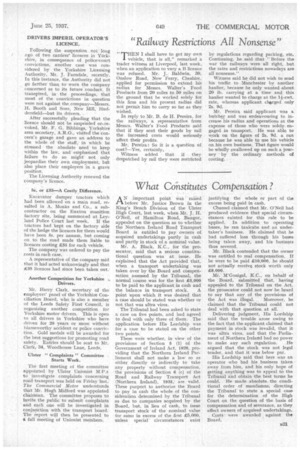What Constitutes
Page 35

If you've noticed an error in this article please click here to report it so we can fix it.
Compensation?
AN important point was raised before Mr. Justice Brown in the King's Bench Division of the Ulster High Court, last week, when.Mr. J. H. O'Neil, of Hamilton Road, Bangor, appealed on the question as to whether the Northern Ireland Road Transport Board is entitled to pay owners of acquired undertakings partly in cash and partly in stock of a nominal value.
Mr. A. Black, K.C., for the prosecutor, said that a serious constitutional question was at issue. He explained that the Act provided that, when a transport undertaking was taken over by 'the Board and compensation assessed by the Tribunal, the normal course was for the first £5,000 to be paid to the applicant in cash and the balance in transport stock. A point upon which it was desired that a case should be stated was whether or not that was ultra vices.
The Tribunal had been asked to state a case on five points, and had agreed to deal with only three of them. The application before His Lordship was for a case to be stated on the other two points.
These were whether, in view of the provisions of Section 5 (1) of the Government of Ireland Act, 1920, providing that the Northern Ireland Parliament shall not make a law so as either directly or indirectly to take any property without compensation, the provisions of Section 6 (c) of the Road and Railway Transport Act (Northern Ireland), 1935; are valid. These purport to authorize the Board to pay in cash the whole of the consideration determined by the Tribunal as due to companies acquired by the Board, but, in lieu of cash, to issue transport stock of the nominal value for SUMS in excess of the first £5,000, unless special' circumstances exist
justifying the whole or part of the excess being paid in cash.
Chunsel claimed that Mr. O'Neil had produced evidence that special circumstances existed for this rule to be applied. In addition to operating buses, he ran taxicabs and an undertaker's business. He claimed that he had suffered loss through his buses being taken away, and his business thus severed.
Mr. Black contended that the owner was entitled to real compensation. If be were to be paid £10,000, he should not actually receive stock worth only £8,000.
Mr. M'Conigal, K.C., on behalf of the Board, Submitted that, having appealed to the Tribunal on the Act, the prosecutor could not now be heard to say that any of the provisions of the Act was illegal. Moreover, he claimed that the Tribunal could not deal with that question at all.
Delivering judgment, His Lordship said that the trouble arose owing to the fact that the applicant claimed that payment in stock was invalid, that it was ultra vires, and that the Parliament of Northern Ireland had no power to make any such regulation. He argued that the stock was not legal tender, and that it was below par.
His Lordship said that here was an operator who had his business taken away from him, and his only hope of getting anything was to appeal to the Tribunal and obtain the best terms he could. He made absolute the conditional order of mandamus, directing the Tribunal' to state a special case for the determination of the High Court on the question of the basis of compensation and of severance, as they affect owners of acquired undertakings.
• Costs 'were awarded against the Board.




























































































